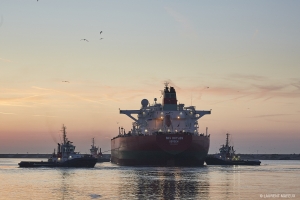


(Posted on 10/06/19)
For more than 10 years, Dunkerque-Port, the largest French port for ore and coal imports, has pursued a genuinely proactive policy in favour of sustainable development of the port. Implemented in 2014 by the roll-out of the Structural and Sustainable Development Plan (PA2D) which defines and supervises more than 150 operations in that respect, it has resulted in the use of good environmental practices especially in terms of dredging sediment management and preserving biodiversity. The mature strategy recently developed into an environmental management system, which obtained Port Environmental Review System (PERS) certification in 2018 as part of the ECOPORT network.
Marking the European Sustainable Development Week from 30 May to 5 June, and in order to accentuate the efforts made to reduce atmospheric emissions, in particular through the Regional Climate, Air and Energy Action Plan (SRCAE) backed by the Dunkerque Urban Community (CUD), Dunkerque-Port has launched an environmental reward system for low-emission vessels calling at Dunkerque. The initiative will help to improve air quality.
Air quality and a reduction in the emissions of sulphur, nitrogen and other fine particles have become international priorities. This is evidenced by the regulatory changes initiated by the International Maritime Organization (IMO).
The maritime transport sector, a contributor to atmospheric emissions, is making positive progress in this direction by offering ever more efficient, energy-efficient vessels and using fuels that have less impact on the environment.
To encourage this change, Dunkerque-Port has joined forces with the Environmental Ship Index initiative (ESI) initiated by the International Association of Ports and Harbours (IAPH), the principle of which is to assign a score to ships based on their atmospheric emissions. The higher the ship's rating, the cleaner its air quality.
Companies and charterers that call at Dunkerque are invited to join this responsible initiative by signing a charter. The latter is intended to underline the willingness of companies and charterers to use more efficient, low-emission vessels for their port calls in Dunkerque. In return, Dunkerque-Port undertakes to pay a financial reward at the end of each year. The latter is calculated on the basis of the number of clean port calls made by the company or the charterer, in proportion to the total number of clean port calls recorded in the port over one year. An annual envelope will be distributed among the signatories of the charter.
Dunkerque-Port is one of the 50 or so volunteer ports in the world that have already approved the initiative.
With this year’s Rail Conference “Rail Freight Transport and Seaports”, a joint initiative... Read more
Asian Bulk Logistics (ABL Group) and ICG have jointly announced the successful completion of ABL&rsquo... Read more
Abu Dhabi based AD Ports Group, a leading global enabler of integrated trade, industry and logistics... Read more
The Executive Board of Hamburger Hafen und Logistik AG (HHLA) has appointed Patrick Krawutschke as Managing... Read more
Abu Dhabi based AD Ports Group, a global enabler of integrated trade, transport, industry, and logistics... Read more
This year marks a significant milestone in maritime innovation as Port Hedland, Australia, celebrates... Read more
Associated British Ports (ABP), the UK’s leading port operator, has announced the latest tranche... Read more
During the Investment, Labour, and Trade Promotion Programme in Japan (November 16–22, 2025),... Read more
AD Ports Group subsidiary Khalifa Economic Zones Abu Dhabi - KEZAD Group, the largest operator of integrated... Read more
Abu Dhabi based AD Ports Group, a global enabler of integrated trade, transport, industry, and logistics... Read more